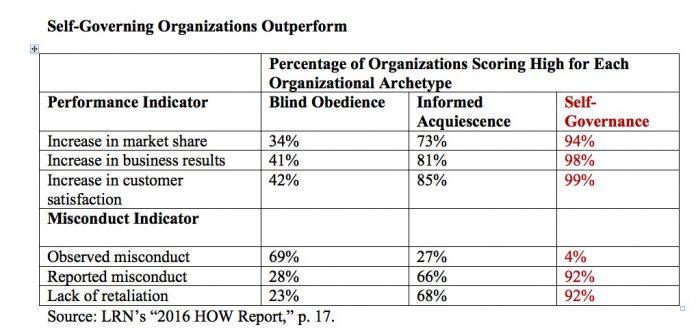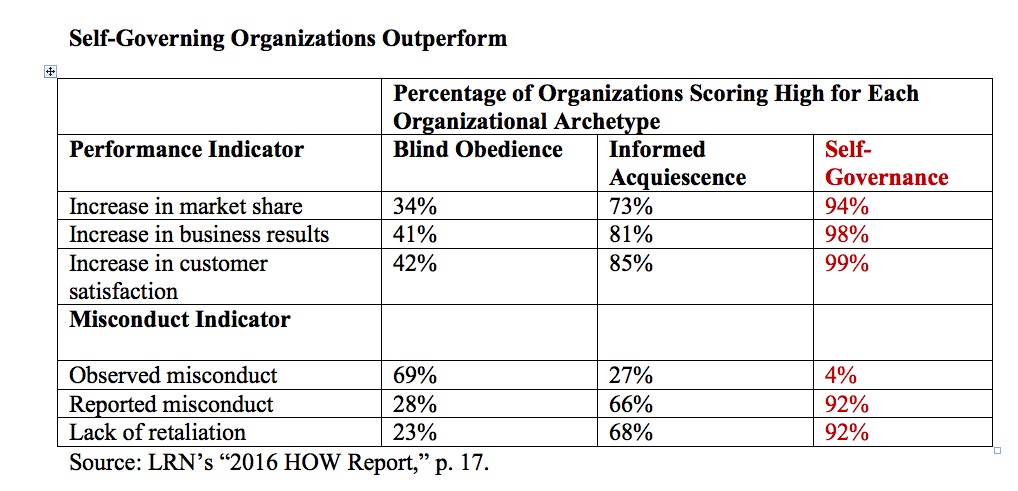
Companies pay a heavy price for ethical and compliance breaches—and the frequency of these transgressions and the financial penalties seem to be increasing. Wells Fargo, Volkswagen, and Barclay’s Bank are only three of the most egregious recent examples. Wells Fargo employees opened 2 million deposit and credit card accounts without their customers’ knowledge—resulting in $185 million in federal and state fines. Volkswagen built a system that cheated on emissions tests in violation of the Clean Air Act—and was fined $14.7 billion. Barclay’s Bank reached a $100 million settlement with the District of Columbia and 42 states for manipulating the London Inter bank Offered Rate (LIBOR), which banks use to set consumer lending rates.
Each of these organizations is a successful business with a long history of professional management. Why couldn’t they perform ethically and avoid such significant fines? Many companies consider such financial penalties as the cost of doing business. But as Paul McNulty, former deputy attorney general of the United States, has noted, “if you think compliance is expensive, try non-compliance.”
BUSINESS CULTURE MAKES A DIFFERENCE
LRN, an ethics and compliance consulting firm, has done extensive research into the type of organizations that perform best. LRN’s “2016 HOW Report,” based on data collected from 16,000 employees in 17 countries, shows that self-governing organizations—those whose employees are inspired by a desire for significance and are encouraged to act as leaders regardless of role—“outperform across a broad spectrum of key outcomes.”
LRN examined three business archetypes:
Blind obedience: These organizations assume employees are unmotivated and require close supervision. Managers and supervisors are required to control workers. There are many formal rules and little delegation of authority, and control remains firmly centralized.
Informed acquiescence: These organizations are characterized by good management and are process driven. Employees are motivated by performance-based rewards and are expected to fulfill their roles.
Self-governance: These organizations assume employees are happy to work, are self-motivated and creative, and enjoy working with greater responsibility. The organizations are characterized by purpose-inspired values and are led with moral authority, core principles, and social expectations.
The chart below shows how organizations that are “self-governing” outperform on key business and compliance measures.

TAKE THE HOLISTIC VIEW OF ORGANIZATIONS
While the three LRN archetypes are behavioral, organizations are much more than that—and a Training professional needs to take in the “big picture.” A holistic view is composed of not just the behavioral and interpersonal sides, but also the formal organizational structures. As Quality guru W. Edwards Deming noted, “A bad system will beat a good person every time.” Deming emphasized that not only are the intentions and culture of an organization important, but the formal underlying structures and processes shape how people work together and relate to each other.
Given the magnitude and pervasiveness of ethical and compliance violations, what might be done to help ensure success?
The holistic view integrates several different perspectives. The core starts with concepts presented by New York University Stuyvesant P. Comfort Professor of Law Geoffrey Parsons Miller. He speaks to the impact of market and environmental forces that create biases— and these biases skew the understanding of objective reality. Professor Miller identifies three fundamental areas that can affect ethical and compliance behavior:
- Knowledge and skills
- Culture, as exemplified by an organization’s leadership, values, and norms
- Structure, composed of formal arrangements that are embodied by the changing regulatory environment, performance incentives, and the organization’s market
WHAT IS THE TRAINER’S ROLE?
Often, the Training professional is asked to provide compliance training. And although compliance training is critically important, we must take note of Professor Miller’s caution: “Teaching can only provide knowledge and skills. In legal ethical practice, I can teach you the rules, but I can’t teach you to be ethical.”
Not much can change a person’s moral compass, but the lessons of experience can shape values, deepen judgement, engrain the organizational culture, and expand the range of ethical choices available to an individual.
That is where the Training professional can make a difference. Trainers are expert at integrating people into the organization and helping them internalize the culture, the formal structures, and the expectations for behavior.
Trainers know how to create a blended approach to learning that uses a range of methodologies:
- Informal, on-the-job, experience-based projects and practice account for approximately 70 percent of what an individual needs to know in order to be successful.
- Coaching, mentoring, and developing through others account for another 20 percent.
- Formal learning interventions and structured courses provide the remaining 10 percent.
The trainer also knows that job aids and performance support systems can minimize the need for training, while ensuring good performance.
Developing leaders is another core area where Training professionals can use their expertise to make a difference. The role of leadership can never be underestimated in creating a culture of performance, ethics, and compliance.
Trainers need to employ a significant level of performance consulting expertise. The diagnosis of probable causes and how to shape culture can be complex and politically challenging. This requires the Training professional to use a broad organizational perspective and take an approach that identifies stakeholders and leverage points for change, and integrates the organization’s formal structures, social systems, and leadership.
Sheryl Smikle, former Compliance Learning and Communications senior manager at GE Capital, provides an example from her experience to illustrate the importance of the integration of structure and leadership to focus the messages that shape organizational culture and direction. “On one level, you need to be able to provide the rationale for the reports, controls, rewards, and follow-up,” she says. “But the real key is leadership and culture. When there is ambiguity at the top, when they give lip service, employees will see it.”
TRAINER AS PERFORMANCE CONSULTANT
To truly make a difference, the Training professional needs to take a performance consulting perspective. Creating an ethical and compliant organization requires a holistic approach that includes understanding the organization’s structure, culture, leadership, and learning methodologies. Because trainers have a unique perspective about people and the capacity to take a holistic approach, we make vital contributions to creating an organization that is ethical, compliant, and successful in the marketplace.
Ross Tartell, Ph.D., is currently adjunct associate professor of Psychology and Education at Columbia University. Dr. Tartell also consults in the areas of learning and development, talent planning, and organization development. He received his M.B.A. in Management and his Ph.D. in Social Psychology from Columbia University. He formerly served as Technical Training and Communications Manager – North America at GE Capital Real Estate.



